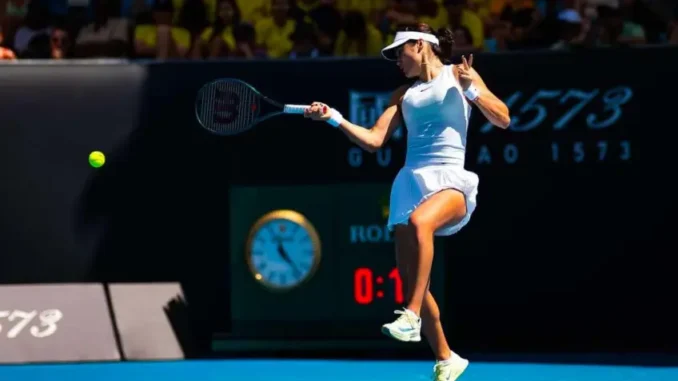
Boris Becker, the legendary six-time Grand Slam champion, has issued a stern warning to Emma Raducanu after the British tennis star made headlines with some eye-catching and potentially risky statements about her career. Becker, known for his no-nonsense approach and deep understanding of the pressures of professional tennis, urged Raducanu to tread carefully as she navigates the demanding path of the WTA Tour.
Raducanu, the 2021 US Open champion, has endured a turbulent journey since her meteoric rise to fame. At just 18 years old, she became the first qualifier in history to win a Grand Slam title, captivating the tennis world with her poise, athleticism, and unshakable composure under pressure. However, the subsequent years have been anything but smooth, as injuries, inconsistent performances, and off-court scrutiny have tested her resilience.
Recently, Raducanu made comments suggesting she is willing to push her physical and mental limits to reclaim her place among the sport’s elite. While her determination is admirable, Becker’s warning highlights the potential dangers of such an approach, particularly for a young athlete still finding her footing in the professional circuit. Drawing from his own experiences, Becker emphasized the importance of balance and longevity, cautioning against a mindset that prioritizes short-term gains over long-term well-being.
Becker’s concerns stem from the grueling demands of modern tennis. The physical toll of competing on the WTA Tour is immense, with players required to maintain peak fitness across multiple surfaces and conditions throughout the year. Injuries are an ever-present risk, and for Raducanu, they have been a recurring theme since her breakthrough in 2021. Persistent issues with her wrist and back have forced her to miss significant chunks of the season, disrupting her momentum and leaving her struggling to find consistency.
The German icon warned that Raducanu’s focus should be on building a sustainable career rather than attempting to achieve instant success. “Tennis is not a sprint; it’s a marathon,” Becker remarked during a recent interview. “It’s easy to get caught up in the pressure to perform immediately, but the key to success lies in pacing yourself, managing your body, and understanding that every great champion had their ups and downs.”
Becker’s advice is particularly poignant given his own career trajectory. As a prodigy who burst onto the scene by winning Wimbledon at just 17 years old, Becker understands better than most the weight of expectations placed on young stars. His rapid ascent brought immense fame and fortune, but it also came with challenges, including injuries and the pressure to maintain his status as one of the world’s best. In Raducanu, Becker sees echoes of his younger self and is keen to ensure she learns from his experiences.
Raducanu’s comments about pushing her limits reflect her hunger to return to the top, but they also raise questions about her support system and decision-making process. In the high-stakes world of professional tennis, having a strong team is crucial for managing both physical and mental demands. Becker highlighted the importance of surrounding oneself with experienced coaches, trainers, and advisors who can provide guidance and protect a player from overexertion.
The British star has faced criticism in the past for her frequent changes in coaching staff, which some have argued contribute to her struggles with consistency. While Raducanu has defended her decisions as necessary steps in finding the right fit, Becker’s warning serves as a reminder of the value of stability and trust in a player-coach relationship. “A good team is not just about technical training,” Becker stated. “It’s about having people who understand your body, your mind, and what it takes to compete at the highest level over time.”
Another aspect of Becker’s cautionary message revolves around the mental pressures of life on tour. Raducanu’s rapid rise to fame brought with it a level of public and media scrutiny that few players experience. From endorsement deals with global brands to constant speculation about her form, every aspect of her life has been under the spotlight. Becker, who experienced similar challenges during his career, emphasized the importance of mental fortitude and the need to block out external noise.
“The public loves a success story, but they also love to dissect every failure,” Becker observed. “It’s important for Emma to focus on herself and not let the opinions of others dictate her journey. The road to greatness is rarely smooth, and she must trust the process.”
Raducanu’s talent is undeniable, and her US Open triumph will forever remain a testament to her potential. However, as Becker wisely points out, success at the highest level requires more than just raw ability. It demands discipline, patience, and an unwavering commitment to self-care. For Raducanu, this means recognizing when to push forward and when to step back, ensuring her career is built on a solid foundation rather than fleeting moments of brilliance.
Becker’s warning is not a critique but a message of support from one champion to another. He sees in Raducanu a player capable of achieving greatness, but only if she avoids the pitfalls that have derailed many promising careers. By heeding his advice and prioritizing her long-term health and development, Raducanu has the opportunity to not just reclaim her place among the elite but to establish herself as a mainstay in the sport for years to come.
As the tennis world watches her next moves with bated breath, Raducanu’s journey serves as a poignant reminder of the challenges young athletes face in the spotlight. With the right guidance and a focus on balance, she has every chance of fulfilling her immense potential. And with voices like Boris Becker offering wisdom from experience, Raducanu is well-positioned to learn, adapt, and thrive in the demanding world of professional tennis.
Leave a Reply